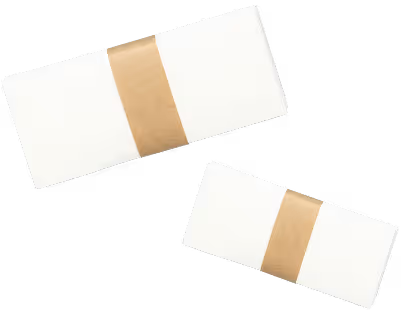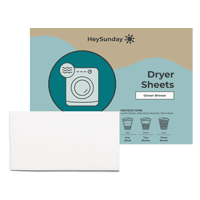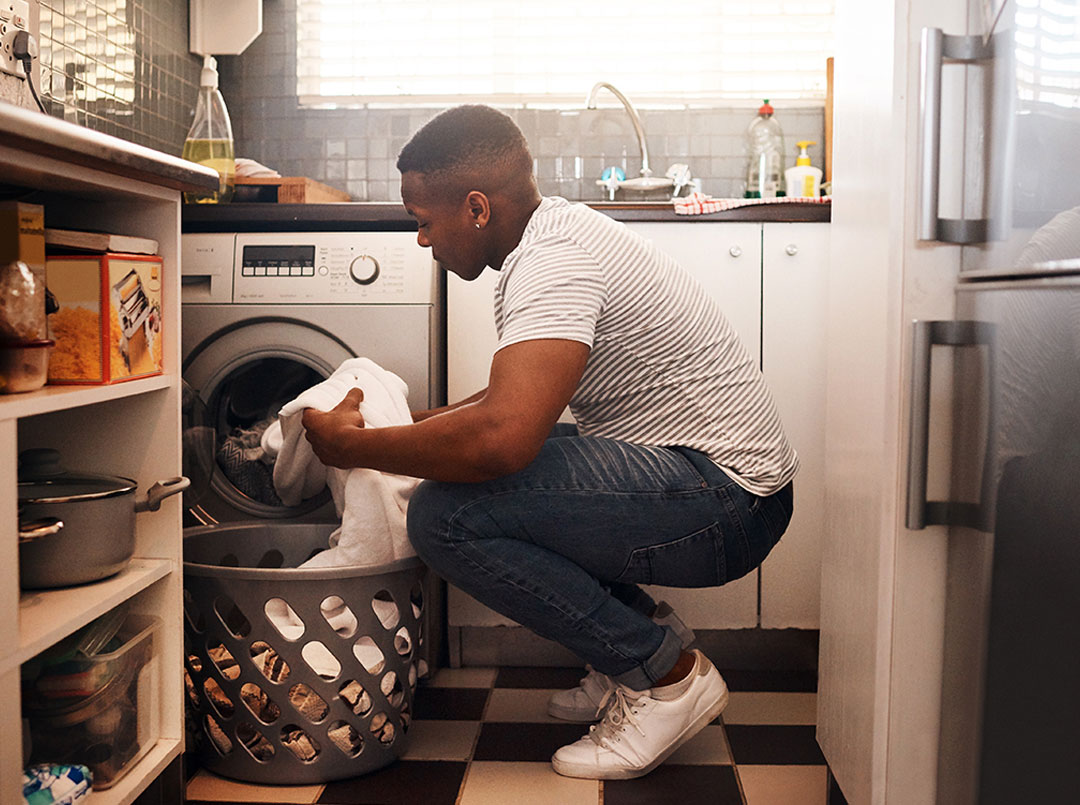
Can You Wash Towels with Clothes? Laundry Tips for Busy Families
Have you ever accidentally left your towels in the washing machine overnight, only to come back the next morning and find them smelling just a bit..moldy? We have two kids and one big dog at home, and I am always doing laundry!
If I’m in a rush, I will absolutely throw any towels in with my clothes to save time doing an extra load.
But every time I do, I hear my mom’s voice in the back of my head telling me that I need to sort the laundry (and I hear my 16 year old self saying I don’t have time for that, I have other things to do!).
I wanted to learn more about why we would sort towels from clothes, when we need to - and when we can get away with throwing everything in the wash all together.
Because I’m coming from HeySunday, I also have a pro tip for laundry detergent sheets - if you’re doing an extra large load or washing anything extra dirty, use an extra sheet!
Understanding Laundry Basics: Why Proper Sorting (Still) Matters
My research does show that my mom was right - sorting your clothes by type, color and instructions matters (do you know what the laundry care symbols mean? We’re here to help!).
The #1 reason to sort your clothes from your towels is to make sure that your clothes don’t get into a tangled mess! If you have large towels, they’ll turn into noodles when they’re wet and attach to all of your clothes in the wash.
Let’s talk laundry sorting. Sure, it takes a little extra time upfront, but it can save you a lot of hassle later. Here’s why sorting your laundry is worth it:
- Color Bleeding: Ever tossed a new red shirt in with whites? Yep, pink dingy disaster.
- Bacteria Transfer: Towels are bacteria magnets. Keep them separate to protect your clothes!
- Fabric Damage: Mixing heavy towels with delicate fabrics can lead to some serious wear and tear.
In short, sorting your laundry keeps your clothes, towels, and linens looking their best for longer. We want to make sure you’ll be smiling every time you pull clean laundry from the machine!
Can You Wash Towels with Clothes? (The Quick Answer)
Yes, you can wash your towels with clothes, but it’s not always ideal. Separating towels from your clothing is an important step to ensure both fabrics are properly cleaned and cared for.
Some clothing, such as athletic wear, blouses, and intimates, may require a delicate cycle and cold wash. By contrast, towels hold more water, need a hotter wash, and shed more lint than regular clothes. Washing your towels separately keeps lint and fibers from getting stuck to your clothes and allows for the higher temperature needed to kill bacteria.
Think of towels like sponges–they soak up a lot! Mixing them with lightweight clothes can result in uneven cleaning. Instead, pair towels with other heavy items like jeans or blankets when you need to combine loads.
The Reasons Behind Washing Towels Separately
There are solid reasons why separating towels from clothes can make a difference.
Towels Get Dirty Quickly
The first and foremost reason is that towels absorb more bacteria, oils, and lint compared to your clothes, meaning that they require cleaning steps slightly differently.
A 2023 study found that towels are home to bacterial communities and biofilm. Yeah, okay, so what does that mean to you and your family? The potential for fungal infections, trigger eczema flare-ups, trap allergens, and more. The study compared the towels to clothes, which did not carry the same amount of bacteria found on the towels.
Separating your towels from the rest of your laundry is a no-brainer to prevent bacteria and other allergens from getting transferred to your clothes.
Different Wash Cycles
Professionals recommend washing your towels in a hot water cycle to kill any lingering bacteria that may cause irritation or infections. Washing your towels separately is essential to keeping these bacteria from transferring to your clothes and other linens and making them less hygienic.
Since washing your towels requires hot water, it’s best to keep your other laundry separate to prevent damage.
Though washing your towels with your other clothes may seem like a laundry shortcut, using the improper water temperature can harm the fabrics, let alone fail to get them thoroughly clean!
Size Differences
Towels are bulky and designed to absorb a lot of water. Clothes, on the other hand, are often lighter-weight and smaller in size.
It’s important to separate your clothes from towels before washing to ensure both get cleaned equally and aren’t competing for space and suds during the wash cycle. The heavier towels may also get damaged by zippers, hooks, pulls, and other clothing fasteners.
How to Properly Wash Towels
Now that we know why it’s best to wash towels separately, let’s talk about how to wash them the right way:
- Sort Your Laundry: Separate towels from clothes and other linens to ensure you can properly wash them without damaging your other fabrics in the process.
- Set the Water Temperature on Your Washing Machine: Experts recommend washing your towels in hot or warm water for hygiene.
- Measure Your Detergent Properly: Too much detergent can leave your towels with residue buildup. Avoid overusing detergent by opting for pre-measured detergent sheets, such as the ones from HeySunday. (Plus, they’re great in all water temps!)
- Skip Fabric Softeners or Other Add-Ins: Fabric softeners may make your towel feel super soft but, unfortunately, reduce its absorbency.
- Dry Properly: As you transfer your clean towels from the washing machine to the dryer, shake them out—this helps them come out of the drying machine perfectly fluffy.
A common question is whether it’s best to air dry or machine dry towels. Air drying is great when you have time. Plus, you’re putting less wear and tear on your towel when you skip the dryer, helping the towels last longer.
But, if you’re like me and need to speed things up, the dryer works well, too–just use the “towels” setting for best results. To get extra-fluffy towels, give them a shake as you transfer them from the washing machine to the dryer.
Best Practices for Washing Clothes and Towels Together (When You Must)
Sometimes, life gets busy, and sorting laundry isn’t in the cards. Here’s how to get the best results when you need to wash towels and clothes together.
Use Color Catchers
Sold in the laundry section at most stores, color catchers products absorb dyes and dirt in the water to prevent colors from transferring fabrics. They can be a lifesaver for busy families because they allow you to throw everything in the wash without thinking about sorting laundry.
Avoid Overloading
Overloading the washing machine is easy to do, so be mindful when filling it! Make sure to stay within the recommended load limit to ensure your clothes are clean and rid of laundry detergent residue when they emerge.
Be Aware of Fabric Types
If you can, try to take the time to separate your laundry by fabric type. For example, avoid washing delicate clothing with heavy towels or bedding. This ensures everything is thoroughly washed and nothing emerges from the washing machine damaged.
Cold Water for Mixed Loads
If you’re washing a load of mixed items and colors, set the washing machine to cold. Cold water prevents colors from transferring from colorful items onto lighter-colored fabrics.
If your washing machine doesn’t have a cold setting, then sorting your laundry is your best precaution to keep the colors from bleeding.
Should You Wash Towels More Frequently? Probably!
Experts recommend washing bath towels after 3-4 uses and hand towels even more frequently. I know it may sound like a lot, especially if you’re a busy parent!
However, it’s important to wash your towels more frequently to keep germs, bacteria, and mold at bay. Plus, frequent washing ensures residue doesn’t build up and get stuck in the fibers of your towels, ensuring that the towels remain soft and absorbent for years to come.
Get the Stink Out: How to Deal with Smelly, Mildewy Towels
Let’s face it, towels can start smelling funky fast. Mildew and stale smells can come from not drying your towel properly after each use or overusing laundry detergent.
If they get that must scent, try these tricks:
- Vinegar Rinse: Wash your towels in hot water with one cup of distilled white vinegar, no detergent. Follow with a rinse cycle to remove any lingering vinegar scent.
- Baking Soda Boost: For stubborn smells, wash in hot water with a cup of baking soda. Skip the detergent and softener to let the baking soda work its magic.
Make sure those towels are odor-free before putting them in the dryer–heat can lock in any remaining smell.
Final Thought: Separate Those Towels When Possible!
Laundry doesn’t have to be complicated! While it is best to wash towels separately, remember that it is not the end of the world if you sometimes combine them with other clothes. Just follow these tips to ensure everything comes out clean and fresh.
Remember, laundry is all about finding what works best for you. These simple tricks–like keeping a separate basket for dirty towels and using easy detergent sheets–can make a big difference in how smoothly your laundry routine goes.














“My sheets have never felt cleaner. I’m hooked.”
“Finally — detergent that actually works and doesn’t take up half the shelf.”
“Hey Sunday WORKS. Great for stains, and no buildup in the washer.”
“We switched from liquid. The scent is amazing and it saves us money.”
“I’ve got total control with HeySunday. I’ll never go back to powder.”